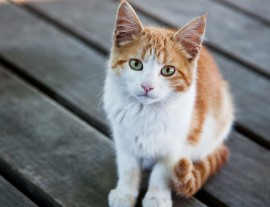Feline Immunodeficiency Virus, or FIV, is a slow-acting virus which suppresses a cat’s immune system over time. The main route of transmission is via infected saliva and blood, usually through fighting with other cats. Wild or feral cats are more likely to carry the virus, though domestic cats can also be infected. While most cats will not show overt signs of disease, an FIV-infected cat will be more prone to secondary infections, tumours, and possible infection of the brain which can lead to seizures and paralysis.
If your cat has been in a cat fight, it is important to seek veterinary treatment for any wounds at the time as these can lead to abscess formation. Testing for FIV infection may be done at the time of the initial treatment to assess your cat’s current FIV status, as well as at a later date to assess whether your cat was infected from the current bite.
If your cat tests negative for FIV, then they can be vaccinated against it. Unfortunately there is no cure if your cat is infected with FIV, though most cats can live a relatively normal life by following a few guidelines. Firstly, a FIV-positive cat should ideally be kept entirely indoors to reduce the chance of spreading FIV to other cats. Desexing will also reduce roaming and fighting tendencies. Any other cats in the household should be tested, and vaccinated against FIV if they are negative.
Regular, twice yearly health checks are recommended to promptly detect changes in health status and treat any diseases as they arise. For example, any degree of dental disease should be addressed promptly, as a cat with a suppressed immune system may not be able to prevent dental bacteria from spreading throughout the body. Regular general blood testing may also help detect signs of internal disease in earlier stages.


